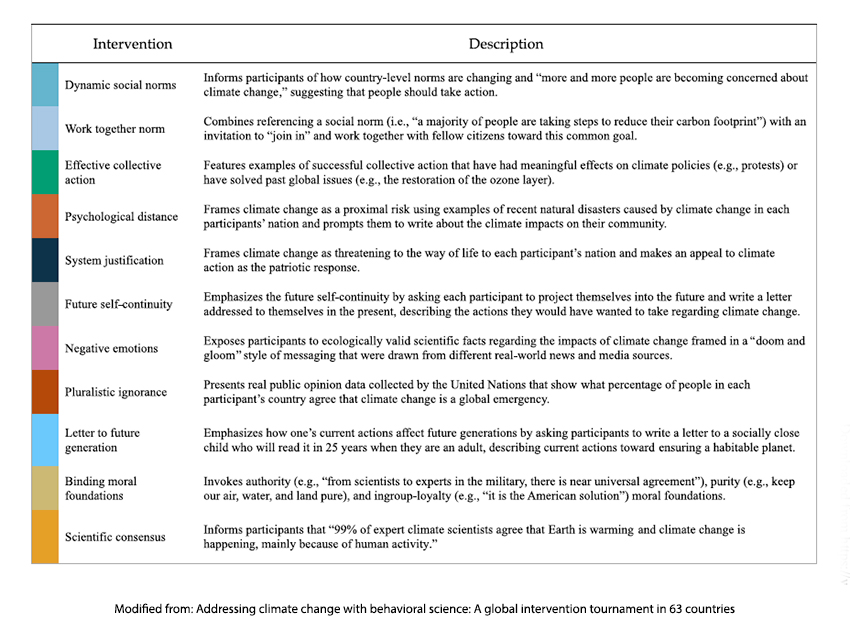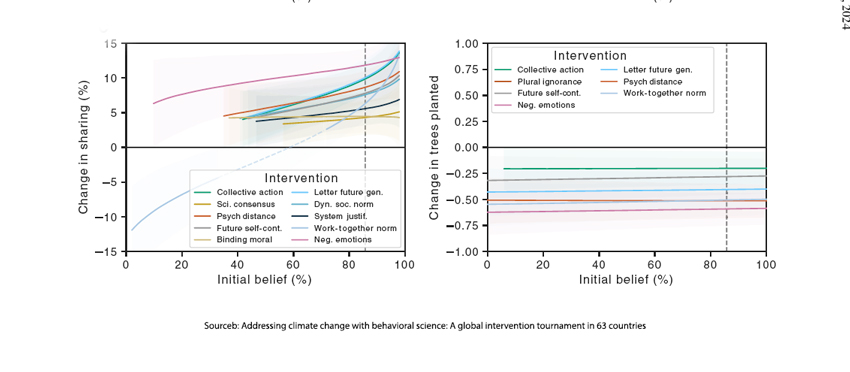In a world grappling with the complexities of climate change, while a majority (85%) believe it exists, words – especially doom and gloom on social media – speak louder than actions. A study sheds light on the challenges of bridging the gap between what we believe and how we act.
“Climate change is the phenomenon describing the fact that the world’s average temperature has been increasing over the past 150 years and will likely be increasing more in the future.”
That was the definition of climate change used in a study of 59,440 online participants from 63 countries searching for first their belief in climate change and then the impact of one of eleven messages on their
- support for climate policies
- willingness to share climate information on social media
- contribute to mitigating climate change by planting trees
The researchers, using a digital form of the Delphi technique, where experts are queried on specific questions to reach a consensus, identified 11 commonly used techniques of persuasion in messaging. The control group was given a neutral book passage to read. Here is a summary of the messaging interventions.

These techniques have all been used as some form of behavioral nudge. For example, the first two were used in the UK to increase the timely payment of taxes. ACSH often relies on scientific consensus; COVID messaging has relied on binding moral foundations, etc.
Moving the needle
“We found that different interventions tended to have small global effects, which varied across outcomes and largely affected nonskeptics…”
Belief in climate change
The participants were asked to gauge the accuracy of four statements regarding climate change. [1] Most participants, ~85%, believed in climate change as defined by the researchers. Decreasing psychological distance, using examples of recent natural disasters, was the most effective means of increasing belief, with an absolute effect size of 2.3%
Climate policy support
The participants were asked how much they agreed with nine policy proposals, including a carbon tax, more EV charging stations, use of wind and solar, more green jobs, etc. [2] Writing to a member of the future generation, and presumably recognizing accountability now for downstream impacts increased policy support the most by 2.6%
Social media sharing
Participants were asked if they would share the following on social media:
“Did you know that removing meat and dairy for only two of three meals per day could decrease food-related carbon emissions by 60%? It is an easy way to fight #ClimateChange”
After excluding those who do not use social media, all interventions generally increased intentions to share by 3-fold more than those messaging variations had on climate change beliefs or policy support. The largest move to “dare to share” was attributable to spreading a message of doom and gloom, the "negative emotion induction" condition, which led to 12.1% more sharing compared to the control condition
Tree planting
Finally, participants were given an opportunity to plant trees. They were told “that planting trees is one of the best ways to combat climate change and that they would have the opportunity to plant up to eight trees.” They were asked to identify numbers that flashed on the screen whose first digit was even and the second odd; for every 60 numbers reviewed, a tree was planted on their behalf. Good news – 50% of the control group planted all eight trees. Bad news – none of the interventions resulted in more trees planted; in fact, some interventional messaging resulted in fewer trees planted.
Words over deeds

The first takeaway is that, just like many nations, we are all in when it comes to promising and committing to climate change. However, when it comes to action, most of us are absent. The second takeaway is that not only are we willing to signal our virtue by sharing the climate change message on social media, but we all respond best to fear, doom, and gloom. It is a hardwired response.
The researchers noted some other variations. Some messaging, for example, around collective action, had a more significant impact on moving those uncertain of climate change than those already convinced. Few, if any, messaging interventions moved climate skeptics to adopt climate policies. Nearly everyone liked sharing doom and gloom, especially skeptics. The researchers were puzzled by the lack of interest in planting trees, irrespective of whether you believe in climate change. They settled on the hypothesis that the tree-planting task required time that individuals were unwilling to make. They controlled for the length of time necessary for the intervention and saw that some messaging increased tree planting, positing that
“in the absence of time constraints, these interventions might increase pro-environmental behavior.”
They even suggested that further research consider behaviors that do not require time, like donations. A whole market in carbon offsets speaks to that tradeoff – people and corporations are far more likely to write a check than change their evil ways.
“The results also indicate that the impact of the interventions on each outcome depends on peoples’ preexisting belief in climate change, supporting the claim that interventions need to be tailored to the characteristics of their audience.”
Changing beliefs is a door-to-door, person-to-person operation. It simply does not scale. At best, all those public service announcements move the needle on an issue by 2 or 3%.
[1] “Taking action to fight climate change is necessary to avoid a global catastrophe,” “Human activities are causing climate change,” “Climate change poses a serious threat to humanity,” and “Climate change is a global emergency.”
[2] “I support raising carbon taxes on gas/fossil fuels/coal?” “I support significantly expanding infrastructure for public transportation,” “I support increasing the number of charging stations for electric vehicles,” “I support increasing the use of sustainable energy such as wind and solar energy,” “I support increasing taxes on airline companies to offset carbon emissions,” “I support protecting forested and land areas,” “I support investing more in green jobs and businesses,” “I support introducing laws to keep waterways and oceans clean,” and “I support increasing taxes on carbon intense foods (for example meat and dairy).”
Source: Addressing climate change with behavioral science: A global intervention tournament in 63 countries Science Advances DOI: 10.1126/sciadv.adj5778

